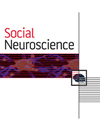Social Neuroscience will feature original articles that examine how the brain mediates social cognition, interpersonal exchanges, affective/cognitive group interactions, and related topics that deal with social/personality psychology. The goal of the journal will be to provide a place to publish articles that intend to further our understanding of the role of the central nervous system in the development and maintenance of social behaviors. Submissions from all branches of neuroscience will be encouraged, including (but not limited to) bio/neuropsychology, evolution, psychiatry, neurology, and neuroscience. Further, submissions that have brain-based empirical data in the fields of social and cognitive psychology, including social cognitive neuroscience, philosophy, or other humanities areas are encouraged. Articles published in Social Neuroscience will cover all neuroscience techniques including neuroimaging methods (e.g., fMRI, PET, ERP, TMS), as well as more traditional neuroscience techniques (e.g., animal studies, case studies, psychiatric populations, post-mortem studies, pharmaceutical, agonist /antagonist). The journal will focus on both molar (i.e., regional cortical localization, neural networks) and molecular (i.e., neurotransmitter) research. All social behaviors will be covered including all aspects of inter- and intra-personal relationships. Both environmental and genetic influences will be presented. Abnormal behaviors and populations will be focused on in terms of understanding social/brain relationships. Language, memory, attention and perception will be appropriate topics if they relate to specific social behaviors or cognitions. Studies that approach social neuroscience from an environmental or genetic approach will be equally appropriate, and related topics that deal with the interface of neuroscientific and social/personality investigations.
